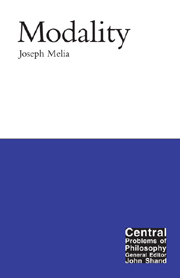3 - Quinian scepticism
Summary
In the first half of the twentieth century, modality was either ignored altogether or regarded with suspicion and scepticism. Of these early modal sceptics, the most suspicious and the most sceptical was W. V Quine. Part of Quine's scepticism stemmed from his belief that modal notions are, in some sense, not required in our philosophical and scientific theorizing. As we saw in Chapter 1, this view now seems scarcely tenable. Today we see modal notions looming large in much of our everyday thought and our scientific and philosophical theorizing. Perhaps future philosophers will one day show us how the modal notions can successfully be eliminated from our theorizing, but until that work is actually done we cannot simply dismiss the modal. But Quine had other reasons for his scepticism. In Quine's view, the logical properties of modal systems are crucially different from the logical properties of his beloved first-order predicate calculus. In particular, the first-order predicate calculus is an extensional logic, while quantified modal logic is intensional. For Quine, there are grave problems in interpreting intensional logics. Quine charges quantified modal systems with giving rise to unintended sense or nonsense, committing us to an incomprehensible ontology, and entailing an implausible or unsustainable Aristotelian essentialism. In this chapter, we shall examine such Quinian arguments against the coherence of the modal. We shall see that such worries were largely misguided and that the possible worlds machinery provides us with the conceptual tools to see off all such objections.
- Type
- Chapter
- Information
- Modality , pp. 63 - 80Publisher: Acumen PublishingPrint publication year: 2003

